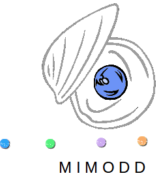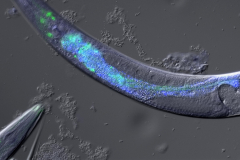
Mutation Identification in Model Organism Genomes using Desktop PCs
MiModD is a comprehensive software package developed in our lab for the mapping, identification and annotation of phenotypic mutations in model organisms from whole-genome sequencing (WGS) data. MiModD was designed specifically to enable biologists/geneticists with limited bioinformatical knowledge to analyze genome-wide sequencing data of their preferred organism on standard desktop computers.
The software supports:
- – short-reads alignment from different input formats (fastq and gzipped fastq, SAM, BAM)
- – conversion between input formats and annotation with run metadata
- – variant calling (SNPs and indels)
- – variant post-processing, including filtering and annotation
- – deletion calling (currently only for paired-end data)
- – linkage analysis support for several different mutation mapping schemes
- – publication-quality plots of linkage data (similar to the output produced by the earlier, but now unmaintained CloudMap suite of tools)
MiModD is free and open-source (released under GPLv3) and runs under Linux and macOS (10.9 through 10.13) with minimal software requirements.
As a standalone package it can be used from the command line, but can also be integrated seamlessly and easily into any local installation of a Galaxy bioinformatics server providing a graphical user interface, database management of results and simple composition of analysis steps into workflows.
Alternatively, MiModD is also available through several public Galaxy servers.
Detailed information on installation, usage and hardware requirements can be found in the user guide. If you have questions that are not answered there, we will be happy to assist you.
The package source code, example datasets and other downloads are available from the project’s homepage at sourceforge.

